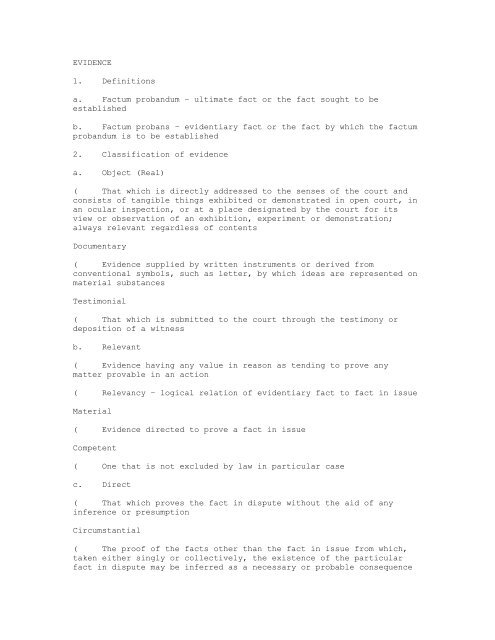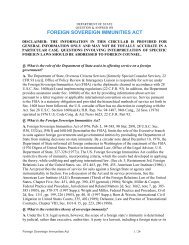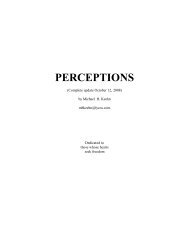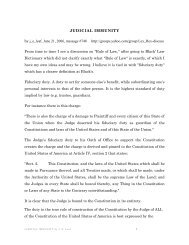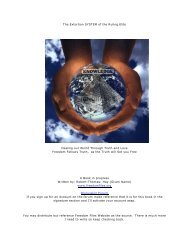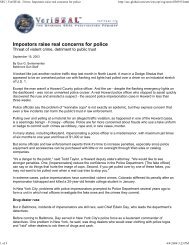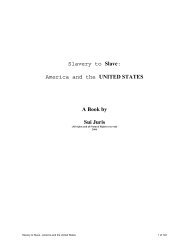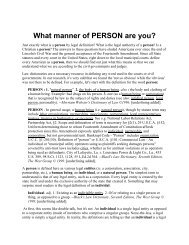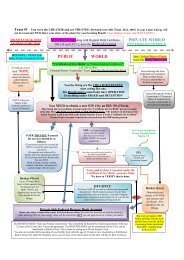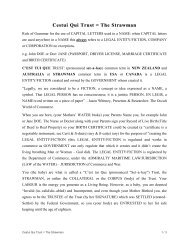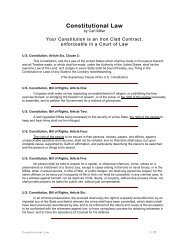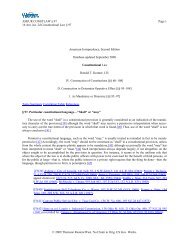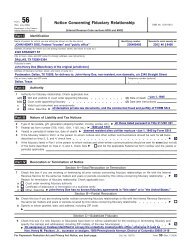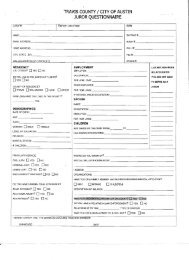EVIDENCE 1. Definitions a. Factum probandum ... - Freedom School
EVIDENCE 1. Definitions a. Factum probandum ... - Freedom School
EVIDENCE 1. Definitions a. Factum probandum ... - Freedom School
Create successful ePaper yourself
Turn your PDF publications into a flip-book with our unique Google optimized e-Paper software.
<strong>EVIDENCE</strong><br />
<strong>1.</strong> <strong>Definitions</strong><br />
a. <strong>Factum</strong> <strong>probandum</strong> – ultimate fact or the fact sought to be<br />
established<br />
b. <strong>Factum</strong> probans – evidentiary fact or the fact by which the factum<br />
<strong>probandum</strong> is to be established<br />
2. Classification of evidence<br />
a. Object (Real)<br />
( That which is directly addressed to the senses of the court and<br />
consists of tangible things exhibited or demonstrated in open court, in<br />
an ocular inspection, or at a place designated by the court for its<br />
view or observation of an exhibition, experiment or demonstration;<br />
always relevant regardless of contents<br />
Documentary<br />
( Evidence supplied by written instruments or derived from<br />
conventional symbols, such as letter, by which ideas are represented on<br />
material substances<br />
Testimonial<br />
( That which is submitted to the court through the testimony or<br />
deposition of a witness<br />
b. Relevant<br />
( Evidence having any value in reason as tending to prove any<br />
matter provable in an action<br />
( Relevancy – logical relation of evidentiary fact to fact in issue<br />
Material<br />
( Evidence directed to prove a fact in issue<br />
Competent<br />
( One that is not excluded by law in particular case<br />
c. Direct<br />
( That which proves the fact in dispute without the aid of any<br />
inference or presumption<br />
Circumstantial<br />
( The proof of the facts other than the fact in issue from which,<br />
taken either singly or collectively, the existence of the particular<br />
fact in dispute may be inferred as a necessary or probable consequence
d. Cumulative<br />
( Evidence of the same kind and to the same state of facts<br />
Corroborative<br />
( Additional evidence of a different character to the same point<br />
for higher probative value<br />
e. Prima facie<br />
( That which standing alone, unexplained or uncontradicted is<br />
sufficient to maintain a proposition<br />
Conclusive<br />
( Class of evidence which the law does not allow to be contradicted<br />
f. Primary or Best<br />
( That which the law regards as affording greatest certainty of the<br />
fact in question<br />
Secondary or Substitutionary<br />
( That which is inferior to the primary evidence and is permitted<br />
by law only when the best evidence is not available<br />
g. Positive<br />
( The witness affirms that a fact did or did not occur<br />
Negative<br />
( The witness states that he did not see or know of the occurrence<br />
of a fact<br />
Rule 129 What Need Not Be Proved<br />
<strong>1.</strong> What do not need to be proved: [NAPITAS]<br />
Matters of judicial notice<br />
Judicial admissions<br />
Facts presumed<br />
Allegations in complaint or answer which are immaterial to the issue<br />
Facts admitted or not denied in the answer, provided they have been<br />
sufficiently alleged<br />
Those which are the subject of an agreed stipulation of facts between<br />
the parties, as well as judicial admissions made in the course of the<br />
proceedings
Technical admission – when defendant fails to specifically deny the<br />
allegations of plaintiff<br />
2. Doctrine of processual presumption – absent any evidence or<br />
admission, the foreign law in question is presumed to be the same as<br />
that in the Philippines<br />
3. Mandatory judicial notice [SLAPTONG]<br />
States – existence, territory, political history, government, symbols<br />
of nationality<br />
Law of nations<br />
Admiralty and maritime courts and seals<br />
Philippine – political constitution and history<br />
Official acts<br />
( Court cannot take judicial notice of a law or regulation that is<br />
not yet effective<br />
( Decisions of SC are proper subjects of mandatory judicial notice<br />
Laws of nature<br />
Measure of time<br />
Geographical division<br />
4. Discretionary judicial notice<br />
Matters which are of public knowledge<br />
( Common and general knowledge<br />
( Indisputable<br />
Matters capable of unquestionable demonstration<br />
Ought to be known by judges because of their judicial functions<br />
( Newspaper reports not subject to judicial notice<br />
( Courts cannot take judicial notice of custom. Custom must be<br />
proved as a matter of fact.<br />
Pardon is granted by the Chief Executive and as such is a private act<br />
which must be pleaded and proved by the person pardoned.<br />
5. Judicial Admissions:<br />
( Verbal or written; made by a party in course of the proceedings<br />
in the same case<br />
( May only be contradicted by showing that:
Made through palpable mistake; or<br />
No such admission was made.<br />
( Admissions made in a pleading later amended: lose their status as<br />
judicial admissions; become merely extra-judicial admissions which must<br />
be offered.<br />
( A stipulation made during a criminal proceeding is tantamount to<br />
a judicial admission and need not be signed as required by R118, §4 to<br />
be binding on the accused.<br />
( A court cannot take judicial notice of an admission made by a<br />
party in another case even if the latter case is pending before the<br />
same sala or judge, except:<br />
In the absence of objection;<br />
With knowledge or upon request of the parties;<br />
It is part of the records.<br />
Rule 130 Rules of Admissibility<br />
<strong>1.</strong> Admissibility of object evidence<br />
Relevant to fact in evidence<br />
Object must be authenticated before it is admitted<br />
Production of documents under this rule and Under Rule 27 (modes of<br />
discovery), distinguished<br />
Rule 130 Rule 27 Production is procured by mere notice to adverse<br />
party, and requirements for such notice must be complied with as a<br />
condition precedent for the subsequent evidence by the proponent<br />
Production is by proper motion in the trial court, and is permitted<br />
only upon good cause shown (mode of discovery)<br />
Presupposes that the document to be produced is intended as evidence<br />
for the proponent who is presumed to have knowledge of its contents,<br />
secondary evidence thereof being available in case of its nonproduction<br />
Contemplates situation wherein document is either assumed<br />
to be favorable to the party in possession thereof OR that the party<br />
seeking its production is not sufficiently informed of the contents of<br />
the same<br />
Best Evidence Rule<br />
<strong>1.</strong> General Rule: When the subject of an inquiry is the contents of a<br />
document, no evidence shall be admissible other than the original<br />
document itself. (If only the fact of execution/existence/surrounding<br />
circumstances only is involved, or when the event is memorialized and<br />
the writing is only incidental, the Rule does not apply)<br />
2. Exceptions to Best Evidence Rule:<br />
a. Original is lost or destroyed, or cannot be produced in court<br />
without bad faith on the part of the offeror;
When the original is in the custody of the party against whom the<br />
evidence is offered, and the latter fails to produce it after<br />
reasonable notice;<br />
When the original consists of numerous accounts or other documents<br />
which cannot be examined in court without great loss of time and the<br />
only fact sought to be established is the general result of the whole;<br />
and<br />
When the original is a public record in the custody of a public officer<br />
or is recorded in a public office.<br />
3. Meaning of “original” document<br />
The one the contents of which are the subject of an inquiry<br />
If in 2 or more copies executed:<br />
At or about the same time; AND<br />
With identical contents<br />
( Then all copies are originals<br />
If entry is<br />
Repeated in regular course of business, with<br />
One being copied from another;<br />
At or near the time of the transaction,<br />
( Then all entries are originals<br />
4. If original is unavailable:<br />
( Order of proof (but can be changed at court’s discretion):<br />
Existence<br />
Execution:<br />
Established by<br />
Person who executed it;<br />
The person before whom its execution was acknowledged<br />
Any person who was present and saw it executed, and recognized the<br />
signature;<br />
Any person to whom the parties to the instrument had previously<br />
confessed the execution thereof<br />
c. Loss or Destruction<br />
( If there are several original copies, all copies must be<br />
accounted for before secondary evidence may be received.<br />
d. Contents<br />
Proof of Contents of Lost Original or Original in custody/control of<br />
adverse party (Secondary Evidence) –
in order stated:<br />
A copy<br />
A recital of its contents in an authentic document<br />
Testimony of witnesses<br />
6. What must be proven if original in possession of adverse party<br />
Opponent’s possession of original<br />
Reasonable notice to opponent to produce the original<br />
Satisfactory proof of its existence<br />
Failure or refusal of opponent to produce original in court<br />
( By opponent’s failure to produce the document on demand, he is<br />
now forbidden to produce the document in order to contradict the other<br />
party’s copy/evidence of its contents<br />
Parol Evidence Rule<br />
<strong>1.</strong> General Rule: When the terms of an agreement have been reduced<br />
into writing, it is considered as containing all the terms agreed upon,<br />
and there can be, between the parties and their successors in interest,<br />
no evidence of such terms other than the contents of the written<br />
agreement<br />
Exceptions to the Parol Evidence Rule:<br />
when a party puts in issue in his pleadings: [FIVE]<br />
Intrinsic ambiguity, mistake or imperfection in the written agreement<br />
Failure of the written agreement to express the true intent of the<br />
parties;<br />
Validity of the written agreement; OR<br />
Existence of other terms agreed upon subsequent to the execution of the<br />
written agreement<br />
NOTE: Parol = evidence aliunde whether oral or written which tends to<br />
deny or contradict documented agreement.<br />
( A “Receipt” or a “Deed” is not an exclusive memorial and facts<br />
contained therein may be shown irrespective of the terms of the<br />
document.<br />
( Distinction must be made between “statements of fact” expressed<br />
in an instrument and the “terms” of the contractual act. The former<br />
may be varied by parol evidence.<br />
( Parol Evidence Rule not applicable to strangers to the contract<br />
ot third parties
Parol Evidence Rule and Best Evidence Rule Distinguished<br />
Parol Evidence Rule Best Evidence Rule Presupposes that the original<br />
document is available in court The original writing is not available<br />
and/or there is a dispute as to whether said writing is the original<br />
Prohibits the varying of the terms of a written agreement Prohibits the<br />
introduction of substitutionary evidence in lieu of the original<br />
documents, regardless of whether or not it varies the contents of the<br />
original With the exception of wills, applies only to documents which<br />
are contractual in nature (written agreements) Applies to all kinds of<br />
writings Can be involved only when the controversy is between the<br />
parties to the written agreements, their privies or any party affected<br />
thereby (does not apply to complete strangers) Can be invoked by any<br />
party to an action, regardless of whether such party participated in<br />
the writing involved<br />
Qualification of Witnesses<br />
<strong>1.</strong> Persons Disqualified from becoming witnesses due to mental<br />
incapacity or immaturity:<br />
a. Those whose mental condition, at the time of their production for<br />
examination, is such that they are incapable of intelligently making<br />
known their perceptions to others; or<br />
( A mental retardate is not, for this reason alone, disqualified<br />
from being a witness.<br />
b. Children whose mental maturity is such as to render them<br />
incapable of perceiving the facts respecting which they are examined<br />
and of relating them truthfully.<br />
But a child, regardless of age, may be considered as a competent<br />
witness, if he is capable of [ORC]:<br />
Observation<br />
Recollection; and<br />
Communication<br />
Marital Disqualification Rule<br />
*During their marriage, neither the husband nor the wife may testify<br />
for or against the other without the consent of the affected spouse,<br />
except in a civil case by one against the other, or in a criminal case<br />
for a crime committed by one against the other or the latter’s direct<br />
descendants or ascendants.<br />
<strong>1.</strong> Exemptions to Marital Disqualification<br />
( Wife may testify against the husband in a criminal case for<br />
falsification, where the husband made it appear that the wife gave her<br />
consent to the sale of a conjugal house (considered as a crime<br />
committed against the wife)<br />
( If husband-accused defends himself by imputing the crime to the wife,
he is deemed to have waived all objections to the wife’s testimony<br />
against him.<br />
Dead Man’s Statute<br />
*Parties or assignors of parties to a case, or persons in whose behalf<br />
a case is prosecuted, against an executor or administrator or other<br />
representative of a deceased person, or against a person of unsound<br />
mind, upon a claim or demand against the estate of such deceased person<br />
or against such person of unsound mind, cannot testify as to any matter<br />
of fact occurring before the death of such deceased person or before<br />
such person became of unsound mind.<br />
<strong>1.</strong> Requisites for Application of Dead Man’s Statute [PACO]<br />
a. The witness is a Party or assignor of a party to a case, or of a<br />
person on whose behalf a case is prosecuted;<br />
( Dead Man Statute not applicable to a corporation’s officers and<br />
stockholders in a suit instituted by the corporation. Thus, the<br />
officers and stockholders may testify.<br />
b. The action is Against an executor, administrator or other<br />
representative of a deceased person, or against a person of unsound<br />
mind;<br />
( Heirs of deceased person are considered “representatives” of a<br />
deceased person.<br />
c. The subject matter of the action is a Claim or demand against the<br />
estate of such deceased person, or against such person of unsound mind;<br />
d. The testimony refers to any matter of Fact occurring before the<br />
death of such deceased person, or before such person became of unsound<br />
mind.<br />
( Not covered by the Rule:<br />
Counterclaim by defendant (plaintiff may testify in his defense)<br />
Deceased contracted with plaintiff thru an agent of the deceased/insane<br />
(in the contract which is the subject of the action) who is still alive<br />
and can testify (but the testimony is limited to the acts performed by<br />
the agent)<br />
If adverse party is called as a witness by the representative of the<br />
deceased/incompetent or if representative introduced evidence as to the<br />
transactions or communications with the deceased/incompetent<br />
To cadastral proceedings, where there is no defendant or plaintiff<br />
Privileged Communications:<br />
<strong>1.</strong> Kinds of Privileged Communications:
Marital privilege<br />
Attorney-client<br />
Doctor-patient<br />
Priest-Penitent<br />
Public Officer’s Privilege
2. Requisites for Marital Privilege<br />
Valid marital relation must have existed<br />
Privilege is claimed with respect to a communication made by one spouse<br />
to another during the marriage;<br />
Communication was made in confidence<br />
3. Marital disqualification and marital privilege distinguished<br />
Marital Disqualification Marital Privilege Can be invoked only if one<br />
of the spouses is a part to the action Can be claimed whether or not<br />
the spouse is a party to the action Right to invoke belongs to the<br />
spouse who is a party to the action Right to invoke belongs to the<br />
spouse making the communication Applies only if the marriage is<br />
existing at the time the testimony is offered Can be claimed even after<br />
the marriage has been dissolved Constitutes a total prohibition<br />
against any testimony for or against the spouse of the witness (with<br />
certain exceptions) Applies only to confidential communications between<br />
spouses made during the marriage<br />
4. Attorney-Client Privilege<br />
There is an attorney-client relationship<br />
There is a communication made by the client to the attorney<br />
Such communication was made in the course of, or with a view to,<br />
professional employment<br />
( Extends to attorney’s secretary, stenographer or clerk; requires<br />
consent of both employer and the client to testify as to matters<br />
learned in their professional capacity<br />
( Exceptions:<br />
Actions brought by client against his attorney<br />
Communications made in presence of third persons<br />
Communications regarding an intended crime<br />
( General Rule: Lawyer may not invoke the privilege and refuse to<br />
divulge the name of his client<br />
Exception:<br />
If there is a probability that the revealing the client’s name would<br />
implicate the client to the activity for which he sought the lawyer’s<br />
advice;<br />
The disclosure would open the client to civil liability;<br />
Where the identity is intended to be confidential<br />
( Privilege not confined to verbal or written communications, but<br />
extends to all information communicated by the client to the attorney<br />
by other means, such as when the attorney is called to witness the<br />
preparation of a document.<br />
5. Requisites for Physician-Patient privilege [CRANB]<br />
The action is a Civil case<br />
The Relation of physician-patient existed<br />
The information was Acquired by the physician while attending to the<br />
patient in his professional capacity<br />
The information was Necessary for the performance of his professional<br />
duty<br />
The disclosure of the information would Blacken the reputation of the<br />
patient<br />
( A patient’s husband is not prohibited from testifying on a report<br />
prepared by his wife’s psychiatrist since he is not the treating<br />
physician (although it would be hearsay)<br />
( A physician is not prohibited from giving expert testimony in<br />
response to a strictly hypothetical question in a lawsuit involving the<br />
physical or mental condition of a patient he has treated
professionally.<br />
6. Requisites for Priest-Penitent Privilege<br />
Confession was made or advice given by the priest in his professional<br />
character in the course of the discipline enjoined by the church to<br />
which the priest or minister belongs;<br />
The confession must be confidential and penitent in character<br />
7. Requisites for Public Officer’s Privilege<br />
Communication made to a public officer in official confidence<br />
Public interest would suffer by the disclosure<br />
8. “Newsman’s privilege” – a publisher, editor, columnist or duly<br />
accredited reporter cannot be compelled to disclose the source of news<br />
report or information appearing in the publication which is related in<br />
confidence, the disclosure of which is not demanded by the security of<br />
the state.<br />
Admissions and Confessions<br />
<strong>1.</strong> Admission and Confession distinguished<br />
Admission Confession Statement of fact which does not involve an<br />
acknowledgment of guilt or liability Involves acknowledgment of guilt<br />
or liability May be express or tacit Must be express May be made by<br />
third persons, and in certain cases, are admissible against a party Can<br />
be made only by the party himself, and in some cases, are admissible<br />
against his co-accused NOTE: If a justification is alleged, it is<br />
merely an admission.<br />
( Right against self-incrimination applies to the re-enactment of<br />
the crime by the accused<br />
2. Requisites for admissibility of an admission<br />
Involves a matter of fact, not of law<br />
Categorical and definite<br />
Knowingly and voluntarily made<br />
Adverse to the admitter's interest, otherwise, self-serving and<br />
inadmissible as hearsay<br />
3. Admissions and Declarations against self-interest distinguished<br />
Admissions Declaration against Interest Need not be, though will<br />
greatly enhance probative weight if made against the interest of the<br />
declarant Must have been made against the proprietary or pecuniary<br />
interest of the parties Made by the party himself and is a primary<br />
evidence and competent though he be present in court and ready to<br />
testify Must have been made by a person who is either deceased or<br />
unable to testify Can be made at any time Must have been made ante<br />
litem motam<br />
4. Compromises<br />
( Civil Cases: not admission of liability<br />
( Criminal Cases: implied admission of guilt.<br />
Except: quasi-offenses or those allowed by law to be compromised, or<br />
when made to avoid risks of criminal actions against him.<br />
( Also, offer to pay expenses occasioned by injury not admissible<br />
as proof of civil or criminal liability for the injury.<br />
( A plea of forgiveness made with the knowledge, consent or<br />
acquiescence of the accused is tantamount to an offer to compromise by<br />
the accused.<br />
( If the purpose of the offer is to buy peace and avoid litigation,
then the offer is inadmissible.<br />
( As held in the case of Daggett v. Atchinson, etc. (48 Cal.2d<br />
655), it is the general rule that evidence of precautions taken and<br />
repairs made after the happening of the accident is not admissible to<br />
show a negligent condition at the time of the accident.<br />
5. Requisites for Admission by Silence (Adaptive Admissions)<br />
The party heard the declaration or observed the act of the other person<br />
He must have understood the statement or act<br />
He was at liberty to interpose a denial<br />
Statement was with respect to some matter affecting his rights or in<br />
which he was then interested, and calling, naturally, for an answer<br />
Facts were within his knowledge<br />
Facts admitted or inference to be drawn from his silence is material to<br />
the issue<br />
The party has no right to remain silent (as held in Commonwealth v.<br />
Dravecz, 424 Pa. 582 or 227 A-2d 904)<br />
( If private complainant in a rape case fails to rebut testimonies<br />
of defense witnesses that she and accused were sweethearts and that<br />
they had previous sexual encounters, she is deemed to have impliedly<br />
admitted the truth of the facts asserted by said witnesses.<br />
6. Res inter alios acta alteri nocero non debet<br />
a. First branch<br />
( Section 20, the rights of a party cannot be prejudiced by an act,<br />
declaration or omission of another<br />
( EXCEPTIONS: where the third person is a partner, agent, joint<br />
owner, joint debtor or has a joint interest with the party, or is a coconspirator<br />
or a privy of the party, during the existence of the<br />
partnership, conspiracy, etc. as established by evidence other than<br />
such act or declaration, or while holding title to property in relation<br />
to such<br />
b. Second branch<br />
( Sec. 34, evidence that one did or did not do a certain thing at<br />
one time not admissible to prove that he did or did not do the<br />
same/similar thing at another time<br />
( Exceptions: [KISSHICUP] it may be received to prove a specific<br />
intent or knowledge, identity, plan, system, scheme, habit, custom, or<br />
usage<br />
7. Admission by a Co-Partner or Agent<br />
Partnership, agency or joint interest is established by evidence other<br />
than the act or declaration<br />
Act or declaration is within the scope of the partnership, agency or<br />
joint interest<br />
Act or declaration must have been made during the existence of the<br />
partnership, agency or joint interest<br />
8. Admission by Co-conspirator<br />
( Requisites apply only to extrajudicial acts or statements, and<br />
not to testimony during trial<br />
Conspiracy is shown by evidence other than the act or declaration<br />
Admission was made during existence of the conspiracy<br />
Admission relates to the conspiracy itself<br />
( An extra-judicial confession of an accused is not admissible in<br />
evidence against his co-accused when the latter had not been given the<br />
opportunity to hear him testify and cross-examine him. Such confession
is not admissible as an Admission by co-conspirator because it was made<br />
after the conspiracy had ended and after the commission of the crime.<br />
9. Admissions by Privies<br />
Must be a relation of privity between the party and the declarant<br />
Admission was made while declarant as predecessor in interest, while<br />
holding title to the property<br />
Admission is in relation to said property<br />
( HOWEVER, such evidence is still not admissible to contradict the<br />
terms of the written instrument<br />
10. Opinion of a witness<br />
Expert – special knowledge, skill experience or training<br />
The matter to be testified to is one that requires expertise<br />
The witness has been qualified as an expert<br />
*It is not enough that a witness who is being presented as an expert<br />
belongs to the profession or calling to which the subject matter of the<br />
inquiry relates. He must further show that he possesses special<br />
knowledge to the question on which he proposes to express an opinion.<br />
Ordinary<br />
Identity of person about whom he has adequate knowledge<br />
Handwriting, if with sufficient familiarity<br />
Mental sanity, if sufficiently acquainted<br />
Impressions on emotion, behavior, condition or appearance which he has<br />
observed<br />
Ordinary matters common to all men of common perception<br />
Hearsay Rule<br />
<strong>1.</strong> Exceptions to hearsay rule<br />
Dying declaration – ante mortem or in articulo mortis<br />
Declaration against interest<br />
Act or declaration against pedigree<br />
Family reputation or traditions regarding pedigree<br />
Common reputation<br />
Res gestae<br />
Entries in course of business<br />
Entries in official records<br />
Commercial lists and the like<br />
Learned treatises<br />
Court takes judicial notice; or<br />
Testified to by an expert<br />
Testimony or deposition at a former proceeding<br />
( Newspaper clippings are hearsay and have no evidentiary value unless<br />
substantiated by persons with personal knowledge of the facts.<br />
2. Doctrine of independently relevant statements<br />
( Independent of whether the facts stated are true, they are<br />
relevant since they are the facts in issue or are circumstantial<br />
evidence of the facts in issue<br />
( Not covered by the hearsay rule<br />
( Example: The statements or writings attributed to a person who<br />
is not on the witness stand are being offered, not to prove the truth<br />
of the facts stated therein, but only to prove that such statements<br />
were actually made or such writings were executed, or to prove the<br />
tenor thereof.<br />
3. Requisites of Declaration Against Interest
a. Declarant dead or unable to testify<br />
( Mere absence from jurisdiction does not make declarant “unable to<br />
testify.” Exception contemplates that the declarant is dead, mentally<br />
incompetent or physically incapacitated<br />
b. Declaration was against his own interest<br />
c. Reasonable man in declarant’s position would not have made the<br />
declaration unless he believed it to be true<br />
( Declarations by accused against his interest are inadmissible if<br />
done in violation of his constitutional rights<br />
4. Requisites of Act or Declaration about Pedigree<br />
Declarant dead or unable to testify<br />
Declarant is related to the person whose pedigree is in question<br />
Made ante litem motam<br />
Relationship between declarant and person whose pedigree is in question<br />
showed by evidence other than the declaration EXCEPT if claiming from<br />
the declarant, where the declaration itself is sufficient<br />
5. Requisites of Family Reputation/Tradition regarding Pedigree<br />
Reputation or tradition exists in family of person whose pedigree is in<br />
question<br />
Reputation or tradition existed previous to the controversy<br />
Witness testifying thereon is a surviving member of that family, by<br />
either affinity or consanguinity<br />
( A person’s statement as to the date of his birth and age, as he<br />
learned of these from his parents or relatives, is an ante litem motam<br />
declaration of family reputation.<br />
6. Requisites of Common Reputation<br />
Facts to which the reputation refers are of public or general interest<br />
Reputation is ancient (or more than 30 years old)<br />
Reputation must have been formed among a class of persons who were in a<br />
position to have some sources of information and to contribute<br />
intelligently to the formation of the opinion<br />
Reputation must exist ante litem motam<br />
( HOWEVER, if the reputation concerns marriage or moral character,<br />
the requisite that the reputation must be ancient does NOT apply<br />
7. Requisites of Dying Declarations<br />
a. Declaration is conscious of impending death<br />
b. Declaration relates to the facts or circumstances pertaining to<br />
the fatal injury or death<br />
Statements referring to the antecedents of the fatal encounter or<br />
opinion, impressions, or conclusions of the declarant are not<br />
admissible. (Professor Bautista believes that the opinion rule is<br />
still applicable in dying declarations.<br />
c. Declarant would have been comptent to testify had he survived<br />
d. Declaration is offered in a case wherein the declarant’s death is<br />
the subject of the inquiry.<br />
Dying declarations are admissible in ANY case not only in criminal<br />
prosecutions for homicide which was the former rule.<br />
8. Res gestae<br />
( 2 kinds/classes:<br />
a. Spontaneous statements;<br />
( Requisites:<br />
There is a startling occurrence
Statement must relate to the circumstances of the occurrence<br />
Statement is unconscious and unpremeditated<br />
( Factors to be considered in determining spontaneity of statement:<br />
Time that elapsed between occurrence and the making of the statement<br />
Place where statement was made<br />
Condition of the declarant when he made the statement<br />
Presence or absence of intervening occurrences between the occurrence<br />
and the statement<br />
Nature and circumstances of the statement itself<br />
b. Verbal acts:<br />
( Requisites:<br />
Res gestae or principal act must be equivocal<br />
Act material to issue<br />
Statements must accompany equivocal act<br />
Statements must give legal significance to equivocal act<br />
9. Res gestae and Dying Declarations distinguished<br />
Res Gestae Dying Declarations Statement of the killer himself after or<br />
during the killing, or that of a third person (e.g., victim, bystander)<br />
Can be made only by the victim Statement may precede, accompany or be<br />
made after the homicidal act was committed Made only after the<br />
homicidal attack has been committed Justified by the spontaneity of<br />
the statement Trustworthiness is based upon its being given under<br />
awareness of impending death<br />
10. Requisites of Entries in the course of business<br />
Entrant is deceased or unable to testify<br />
Entries made at or near the time of the transaction to which they relate<br />
Entries made by entrant in his professional capacity or in the<br />
performance of a duty<br />
Entries were made in the ordinary or regular course of business<br />
Entrant must have been in a position to know the facts therein stated<br />
( Heirs of Conti vs. CA - baptismal certificates are admissible as<br />
entries in the ordinary course of business, even absent the testimony<br />
of the officiating priest or official recorder<br />
1<strong>1.</strong> Requisites of Entries in official records<br />
Entry was made by public officer of the Philippines or by a person<br />
especially enjoined by law to make such entry<br />
Entry was made in the performance of entrant’s duty<br />
Entrant must have been in a position to know the facts therein stated<br />
( Baptismal certificates or parochial records are not public or<br />
official records and are not proof of relationship or filiation of the<br />
child baptized.<br />
12. Entries in the course of business and Entries in official records<br />
distinguished<br />
Entries in the course of business Entries in official records<br />
Sufficient that entrant made the entries pursuant to a duty either<br />
legal, contractual, moral or religious, or in the regular course of<br />
business or duty entrant is a public officer in performance of duty, or<br />
if a private individual, must have acted pursuant to a specific legal<br />
duty (specially enjoined by law) The person who made such entries must<br />
be dead or unable to testify there is no such requirement for<br />
admissibility, precisely because the officer is excused<br />
13. Requisites of Testimony or Deposition in former proceeding<br />
Witness whose testimony is offered is dead or unable to testify
Party against whom the evidence is offered, or his privy, was a party<br />
to the former case or proceeding, judicial or administrative<br />
Testimony or deposition relates to the same subject matter (identity of<br />
issue)<br />
The requirement of identity<br />
Adverse party had opportunity to cross-examine<br />
Testimony given during preliminary investigation where the defense had<br />
the opportunity to cross-examine the unavailable witness is admissible<br />
in the criminal case<br />
14. Modes of Extra-judicial Identification of Accused<br />
Show-ups – where accused alone is brought face-to-face with the witness<br />
for identification<br />
Mug shots – where photographs are shown to the witness for<br />
identification<br />
Line-ups – where a witness identifies the suspect from a group of<br />
persons lined up for the purpose<br />
( Identification will be admissible if it passes the totality of<br />
circumstances test which considers the following factors:<br />
The witness’ opportunity to view the criminal at the time of the crime<br />
Witness’ degree of attention at that time<br />
Accuracy of any prior description by the witness<br />
The level of certainty demonstrated by the witness at the identification<br />
Length of time between the crime and identification<br />
Suggestiveness of the identification procedure<br />
15. The SC approved an additional exception to the hearsay rule in<br />
its A.M. no. 00-4-07-SC approving the Proposed Rule on Examination of a<br />
Child Witness.*<br />
( A statement made by a child describing any act or attempted act<br />
of child abuse NOT otherwise admissible under the hearsay rule, may be<br />
admitted in evidence in any criminal or non-criminal proceeding subject<br />
to the following rules:<br />
Before such statement may be admitted, its proponent shall make known<br />
to the adverse party the intention to offer such statement and its<br />
particulars to allow him an opportunity to object.<br />
If the child is available<br />
( The court shall require the child to be present at the<br />
presentation of the hearsay statement for cross-examination by the<br />
adverse party.<br />
If the child is unavailable<br />
( The fact of such circumstance must be proved by the proponent.<br />
In ruling on the admissibility of such hearsay statement, the court<br />
shall consider the time, content and circumstances thereof which<br />
provide sufficient indicia of reliability. It shall consider the<br />
following factors:<br />
Whether there is a motive to lie<br />
The general character of the declarant child<br />
Whether more than one person heard the statement<br />
Whether the statement was spontaneous<br />
The timing of the statement and the relationship between the declarant<br />
child and witness.<br />
Cross-examination could not show the lack of knowledge of the declarant<br />
child.<br />
The possibility of faulty recollection of the declarant child;<br />
The circumstances surrounding the statement are such that there is no<br />
reason to suppose the declarant child misrepresented the involvement of
the accused.<br />
The child witness shall be considered unavailable in the following<br />
situations:<br />
i. Is deceased, suffers from physical infirmity, lack of memory,<br />
mental illness or will be exposed to severe psychological injury;<br />
Is absent from the hearing and the proponent of his statement has been<br />
unable to procure his attendance by process or other reasonable means.<br />
d. When the child witness is unavailable, his hearsay testimony<br />
shall be admitted only if corroborated by other admissible evidence.<br />
Rule 131 Burden of Proof and Presumptions<br />
<strong>1.</strong> Presumptions of law<br />
May be conclusive or absolute, or disputable or rebuttable<br />
A certain inference must be made whenever the facts appear which<br />
furnish the basis of the inference<br />
Reduced to fix rules and form a part of the system of jurisprudence<br />
2. Presumptions of fact<br />
A discretion is vested in the tribunal as to drawing the inference<br />
Derived wholly and directly from the circs of the particular case by<br />
means of the common experience of mankind<br />
3. Burden of proof<br />
( Onus probandi<br />
( Obligation imposed upon a party who alleges the existence of<br />
facts necessary for the prosecution of his action or defense to<br />
establish the same by the requisite presentation of evidence<br />
( In civil cases, it is on the party who would be defeated if no<br />
evidence is given on either side; in criminal cases, the prosecution<br />
has the burden of proof.<br />
( Does not shift; remains on party upon whom it is imposed<br />
( Determined by pleadings filed by party<br />
( Effect of a legal presumption on Burden of Proof: The effect is<br />
to create the necessity of presenting evidence to meet the prima facie<br />
case created by the presumption; and if no proof to the contrary is<br />
offered, the presumption will prevail. The legal presumption does not<br />
shoft the burden of proof. The burden of proof remains where it is, but<br />
by the presumption, the one who has the burden is relieved, for the<br />
timebeing, from producing evidence in suuport of his averment, because<br />
the presumption stands in place of evidence.<br />
4. Burden of evidence<br />
( Lies with party asserting affirmative allegations<br />
( Shifts during trial, depending on exigencies of the case<br />
( Determined by developments at trial or by provisions of law<br />
(presumptions, judicial notice, admissions)<br />
( In criminal cases, a negative fact must be proven if it is an<br />
essential element of the crime.<br />
( People vs. Macagaling – in a charge of illegal possession of<br />
firearms, the burden is on the prosecution to prove that the accused<br />
had no license to possess the same.<br />
( People vs. Manalo – in a charge for selling regulated drugs without<br />
authority, it was held that although the prosecution has the burden of<br />
proving a negative averment which is an essential element of the crime<br />
(i.e. lack of license to sell), the prosecution, in view of the<br />
difficulty of proving a negative allegation, need only establish a<br />
prima facie case from the best evidence obtainable. In this case, the
lack of license was held to have been established by the circumstances<br />
that the sale of the drug was consummated not in a drug store or<br />
hospital, and that it was made at 10:00 PM.<br />
Rule 132 Presentation of Evidence<br />
<strong>1.</strong> Use immunity<br />
( Prohibits use of the witness' compelled testimony and its fruits<br />
in any manner in connection with the criminal prosecution of the witness<br />
( Where the statute grants only use immunity, merely testifying<br />
and/or producing evidence does not render the witness immune from<br />
prosecution despite his invocation of the right against selfincrimination<br />
2. Transactional immunity<br />
( Grants immunity to the witness from prosecution for an offense to<br />
which his compelled testimony related<br />
3. When leading questions allowed<br />
On cross<br />
On preliminary matters<br />
Difficulty in getting direct and intelligible answers<br />
Unwilling or hostile witness<br />
Adverse party or an officer, director or a corporation or partnership<br />
which is an adverse party<br />
( A misleading question, though not objected to, will not be<br />
evidence of the fact assumed by the improper question.<br />
( NOTE: One who voluntarily offers a witness’ testimony is bound<br />
by such (i.e. cannot impeach or contradict), except:<br />
Hostile witness<br />
Adverse party or rep. of adverse party<br />
Not voluntarily offered but required by law (e.g., subscribing<br />
witnesses to a will)<br />
4. Impeaching witness of adverse party<br />
Contradictory evidence from testimony in same case<br />
Evidence of prior inconsistent statement<br />
Evidence of bad character/general reputation for truth, honesty,<br />
integrity<br />
Evidence of bias, interest, prejudice or incompetence<br />
Evidence of mental, sensory derangement or defect<br />
Evidence of conviction of an offense which affects credibility of<br />
witness<br />
5. Impeaching own witness<br />
( General Rule: Party not allowed to impeach own witness<br />
Exceptions:<br />
Unwilling or adverse witness so declared by the court<br />
Witness who is also an adverse party<br />
Witnesses required by law (e.g., subscribing witnesses to a will)<br />
( May be impeached in all respects as if called by other party, EXCEPT<br />
by evidence of bad moral character<br />
( When a witness who is partly cross-examined dies, his direct<br />
examination cannot be expunged. In People v. Señeris (99 SCRA 92), the<br />
direct testimony of a witness who dies before conclusion of the cross<br />
can be stricken only insofar as not covered by the cross. However,<br />
Professor Bautista does not like this decision because although the<br />
cross was substantially complete, still, the court ordered the direct<br />
examination to be stricken out.<br />
6. Requisites of revival of present memory
Memorandum has been written by him or under his direction; and<br />
Written by him:<br />
When the fact occurred or immediately thereafter; or<br />
At any other time when the fact was fresh in his memory and he knew<br />
that the same was correctly recorded<br />
7. Requisites of Revival of Past Recollection<br />
Witness retains no recollection of the particular facts;<br />
But he his able to swear that the record or writing correctly stated<br />
the transaction when made<br />
8. Revival of present memory and Revival of past recollection<br />
distinguished<br />
Present Recollection Revived Past Recollection Recorded Applies if the<br />
witness remembers the facts regarding his entries Applies where the<br />
witness does not recall the facts involved Entitled to greater weight<br />
Entitled to lesser weight Evidence is the testimony Evidence is the<br />
writing or record Rule of evidence affected is competency of witness,<br />
examination of witness (laying the predicate) Rule of evidence affected<br />
is the best evidence rule<br />
9. Additional modes of authenticating a private writing<br />
Doctrine of self-authentication<br />
( Where the facts in the writing could only have been known by the<br />
writer<br />
Rule of authentication by the adverse party<br />
( Where reply of the adverse party refers to and affirms the<br />
sending and his receipt of the letter in question, a copy of which the<br />
proponent is offering as evidence<br />
10. Authentication not required:<br />
Ancient document<br />
More than 30 years old<br />
Contains no alterations or circumstances of suspicion<br />
Produced from a custody in which it would naturally be found if genuine<br />
Public document or record<br />
Notarial document acknowledged, proved or certified<br />
Authenticity and due execution has been expressly or impliedly admitted<br />
(e.g., actionable documents, failure to deny under oath)<br />
( Computer printouts are inadmissible unless properly authenticated<br />
by a witness attesting that they came from the computer system or that<br />
the data stored in the system were not and could not have been tampered<br />
with before the same were printed out.<br />
1<strong>1.</strong> Handwriting: evidence of genuineness<br />
Witness actually saw person writing the instrument<br />
Familiar with handwriting and witness can give opinion<br />
Comparison of questioned handwriting and admitted genuine specimens<br />
Expert evidence<br />
Offer and Objection<br />
The court shall consider no evidence which has not been formally<br />
offered. The purpose for which the evidence is offered must be<br />
specified.<br />
Exception: If there was repeated reference thereto in the course of<br />
the trial by adverse party’s counsel and of the court, indicating that<br />
the documents were part of the prosecution’s evidence.
( Two requisites must concur (People vs. Napta)<br />
a. The document must have been duly identified by testimony duly<br />
recorded.<br />
b. The document must have been incorporated to the records of the<br />
case.<br />
A party who has introduced evidence is not entitled as matter of right<br />
to withdraw it in finding that it does not answer his purpose; BUT he<br />
may withdraw an offer of an exhibit any time before the court has<br />
passed on its admissibility.<br />
Evidence offered is presumed to be admissible or competent until the<br />
contrary has been established.<br />
( Thus, the opposing party must OBJECT to its introduction.<br />
When to object<br />
Offer Time to Object Offered orally Made immediately after the offer<br />
is made Question propounded in the course of the oral examination of a<br />
witness Shall be made as soon as the grounds thereof shall become<br />
reasonably apparent Offer of evidence in writing Shall be objected to<br />
within 3 days after notice of the offer unless a different period is<br />
allowed by the court.<br />
When is a motion to strike out answer proper?<br />
a. When the witness answered the question before the counsel has a<br />
chance to object<br />
Where a question which is not objectionable may be followed by an<br />
objectionable unresponsive answer<br />
Where a witness has volunteered statements in such a way that the party<br />
has not been able to object thereto<br />
Where a witness testifies without a question being addressed to him<br />
Where a witness testifies beyond the ruling of the court prescribing<br />
the limits within which he may answer<br />
When a witness dies or becomes incapacitated to testify and the other<br />
party has not been given the opportunity to cross-examine the witness.<br />
There must be an objection first before a motion to strike. If the<br />
party slept on his right to object, he cannot later on avail a motion<br />
to strike to exclude the evidence.<br />
When is a motion to strike out improper?<br />
A party cannot insist that competent and relevant evidence be stricken<br />
out for reasons going to his weight, sufficiency or credibility<br />
One cannot move to strike it out because it proves unfavorable to him<br />
7. If court improperly excludes an otherwise admissible evidence,<br />
remedy is to tender the excluded evidence, also known as OFFER OF PROOF:<br />
Documentary – by attaching the document or making it part of the record<br />
Testimonial – by stating the personal circumstances of witness and the<br />
substance of proposed testimony<br />
Rule 133 Weight and Sufficiency of Evidence<br />
<strong>1.</strong> Proof beyond reasonable doubt<br />
( Does not mean such degree of proof as, excluding possibility of<br />
error, produces absolute certainty<br />
( Moral certainty only is required, or that degree of proof which<br />
produces conviction in an unprejudiced mind<br />
2. Circumstantial evidence to sustain conviction must:
More than one circumstance<br />
Facts from which inferences are derived are proven<br />
Combination of all circumstances such as to produce conviction beyond<br />
reasonable doubt<br />
3. Substantial evidence<br />
( That amount of relevant evidence which a reasonable mind might<br />
accept as adequate to justify a conclusion.<br />
Pertinent Provisions of the Implementing Rules of the E-Commerce Act:<br />
Chapter II Legal Recognition of Electronic Data Messages And<br />
Electronic Documents<br />
Section 7. Legal Recognition of Electronic Data Messages and Electronic<br />
Documents. - Information shall not be denied validity or enforceability<br />
solely on the ground that it is in the form of an electronic data<br />
message or electronic document, purporting to give rise to such legal<br />
effect. Electronic data messages or electronic documents shall have the<br />
legal effect, validity or enforceability as any other document or legal<br />
writing. In particular, subject to the provisions of the Act and these<br />
Rules:<br />
A requirement under law that information is in writing is satisfied if<br />
the information is in the form of an electronic data message or<br />
electronic document.<br />
A requirement under law for a person to provide information in writing<br />
to another person is satisfied by the provision of the information in<br />
an electronic data message or electronic document.<br />
A requirement under law for a person to provide information to another<br />
person in a specified non-electronic form is satisfied by the provision<br />
of the information in an electronic data message or electronic document<br />
if the information is provided in the same or substantially the same<br />
form.<br />
Nothing limits the operation of any requirement under law for<br />
information to be posted or displayed in specified manner, time or<br />
location; or for any information or document to be communicated by a<br />
specified method unless and until a functional equivalent shall have<br />
been developed, installed, and implemented.<br />
Section 8. Incorporation by Reference. - Information shall not be<br />
denied validity or enforceability solely on the ground that it is not<br />
contained in an electronic data message or electronic document but is<br />
merely incorporated by reference therein.<br />
Section 9. Use Not Mandatory. - Without prejudice to the application of<br />
Section 27 of the Act and Section 37 of these Rules, nothing in the Act<br />
or these Rules requires a person to use or accept information contained<br />
in electronic data messages, electronic documents, or electronic<br />
signatures, but a person's consent to do so may be inferred from the<br />
person's conduct.<br />
Section 10. Writing. - Where the law requires a document to be in<br />
writing, or obliges the parties to conform to a writing, or provides<br />
consequences in the event information is not presented or retained in<br />
its original form, an electronic document or electronic data message<br />
will be sufficient if the latter:<br />
Maintains its integrity and reliability; and<br />
Can be authenticated so as to be usable for subsequent reference, in
that:<br />
It has remained complete and unaltered, apart from the addition of any<br />
endorsement and any authorized change, or any change which arises in<br />
the normal course of communication, storage and display; and<br />
It is reliable in the light of the purpose for which it was generated<br />
and in the light of all relevant circumstances.<br />
Section 1<strong>1.</strong> Original. - Where the law requires that a document be<br />
presented or retained in its original form, that requirement is met by<br />
an electronic document or electronic data message if –<br />
There exists a reliable assurance as to the integrity of the electronic<br />
document or electronic data message from the time when it was first<br />
generated in its final form and such integrity is shown by evidence<br />
aliunde (that is, evidence other than the electronic data message<br />
itself) or otherwise; and<br />
The electronic document or electronic data message is capable of being<br />
displayed to the person to whom it is to be presented.<br />
For the purposes of paragraph (a) above:<br />
The criteria for assessing integrity shall be whether the information<br />
has remained complete and unaltered, apart from the addition of any<br />
endorsement and any change which arises in the normal course of<br />
communication, storage and display; and<br />
The standard of reliability required shall be assessed in the light of<br />
the purpose for which the information was generated and in the light of<br />
all relevant circumstances.<br />
An electronic data message or electronic document meeting and complying<br />
with the requirements of Sections 6 or 7 of the Act shall be the best<br />
evidence of the agreement and transaction contained therein.<br />
Section 12. Solemn Contracts. - No provision of the Act shall apply to<br />
vary any and all requirements of existing laws and relevant judicial<br />
pronouncements respecting formalities required in the execution of<br />
documents for their validity. Hence, when the law requires that a<br />
contract be in some form in order that it may be valid or enforceable,<br />
or that a contract is proved in a certain way, that requirement is<br />
absolute and indispensable.<br />
Legal Recognition of Electronic Signatures<br />
Section 13. Legal Recognition of Electronic Signatures. An electronic<br />
signature relating to an electronic document or electronic data message<br />
shall be equivalent to the signature of a person on a written document<br />
if the signature:<br />
Is an electronic signature as defined in Section 6(g) of these Rules;<br />
and<br />
Is proved by showing that a prescribed procedure, not alterable by the<br />
parties interested in the electronic document or electronic data<br />
message, existed under which:<br />
A method is used to identify the party sought to be bound and to<br />
indicate said party’s access to the electronic document or electronic<br />
data message necessary for his consent or approval through the<br />
electronic signature;<br />
Said method is reliable and appropriate for the purpose for which the<br />
electronic document or electronic data message was generated or<br />
communicated, in the light of all circumstances, including any relevant<br />
agreement;<br />
It is necessary for the party sought to be bound, in order to proceed
further with the transaction, to have executed or provided the<br />
electronic signature; and,<br />
The other party is authorized and enabled to verify the electronic<br />
signature and to make the decision to proceed with the transaction<br />
authenticated by the same.<br />
The parties may agree to adopt supplementary or alternative procedures<br />
provided that the requirements of paragraph (b) are complied with.<br />
For purposes of subparagraphs (i) and (ii) of paragraph (b), the<br />
factors referred to in Annex “2” may be taken into account.<br />
Section 14. Presumption Relating to Electronic Signatures. - In any<br />
proceeding involving an electronic signature, the proof of the<br />
electronic signature shall give rise to the rebuttable presumption<br />
that:<br />
The electronic signature is the signature of the person to whom it<br />
correlates; and<br />
The electronic signature was affixed by that person with the intention<br />
of signing or approving the electronic data message or electronic<br />
document unless the person relying on the electronically signed<br />
electronic data message or electronic document knows or has notice of<br />
defects in or unreliability of the signature or reliance on the<br />
electronic signature is not reasonable under the circumstances.<br />
Modes of Authentication<br />
Section 15. Method of Authenticating Electronic Documents, Electronic<br />
Data Messages, and Electronic Signatures. - Electronic documents,<br />
electronic data messages and electronic signatures, shall be<br />
authenticated by demonstrating, substantiating and validating a claimed<br />
identity of a user, device, or another entity in an information or<br />
communication system.<br />
Until the Supreme Court, by appropriate rules, shall have so provided,<br />
electronic documents, electronic data messages and electronic<br />
signatures, shall be authenticated, among other ways, in the following<br />
manner:<br />
The electronic signature shall be authenticated by proof that a letter,<br />
character, number or other symbol in electronic form representing the<br />
persons named in and attached to or logically associated with an<br />
electronic data message, electronic document, or that the appropriate<br />
methodology or security procedures, when applicable, were employed or<br />
adopted by a person and executed or adopted by such person, with the<br />
intention of authenticating or approving an electronic data message or<br />
electronic document;<br />
The electronic data message or electronic document shall be<br />
authenticated by proof that an appropriate security procedure, when<br />
applicable was adopted and employed for the purpose of verifying the<br />
originator of an electronic data message or electronic document, or<br />
detecting error or alteration in the communication, content or storage<br />
of an electronic document or electronic data message from a specific<br />
point, which, using algorithm or codes, identifying words or numbers,<br />
encryptions, answers back or acknowledgement procedures, or similar<br />
security devices.<br />
Section 16. Burden of Authenticating Electronic Documents or Electronic<br />
Data Messages. - The person seeking to introduce an electronic document<br />
or electronic data message in any legal proceeding has the burden of<br />
proving its authenticity by evidence capable of supporting a finding
that the electronic data message or electronic document is what the<br />
person claims it to be.<br />
Modes for Establishing Integrity<br />
Section 17. Method of Establishing the Integrity of an Electronic<br />
Document or Electronic Data Message. In the absence of evidence to the<br />
contrary, the integrity of the information and communication system in<br />
which an electronic data message or electronic document is recorded or<br />
stored may be established in any legal proceeding, among other methods<br />
By evidence that at all material times the information and<br />
communication system or other similar device was operating in a manner<br />
that did not affect the integrity of the electronic document or<br />
electronic data message, and there are no other reasonable grounds to<br />
doubt the integrity of the information and communication system;<br />
By showing that the electronic document or electronic data message was<br />
recorded or stored by a party to the proceedings who is adverse in<br />
interest to the party using it; or<br />
By showing that the electronic document or electronic data message was<br />
recorded or stored in the usual and ordinary course of business by a<br />
person who is not a party to the proceedings and who did not act under<br />
the control of the party using the record.<br />
Admissibility and Evidential Weight<br />
Section 18. Admissibility and Evidential Weight of Electronic Data<br />
Messages and Electronic Documents. - For evidentiary purposes, an<br />
electronic document or electronic data message shall be the functional<br />
equivalent of a written document under existing laws. In any legal<br />
proceeding, nothing in the application of the rules on evidence shall<br />
deny the admissibility of an electronic data message or electronic<br />
document in evidence:<br />
On the sole ground that it is in electronic form; or<br />
On the ground that it is not in the standard written form.<br />
The Act does not modify any statutory rule relating to the<br />
admissibility of electronic data messages or electronic documents,<br />
except the rules relating to authentication and best evidence.<br />
In assessing the evidential weight of an electronic data message or<br />
electronic document, the reliability of the manner in which it was<br />
generated, stored or communicated, the reliability of the manner in<br />
which its originator was identified, and other relevant factors shall<br />
be given due regard.<br />
Section 19. Proof by Affidavit and Cross-Examination. - The matters<br />
referred to in Section 12 of the Act on admissibility and evidentiary<br />
weight, and Section 9 of the Act on the presumption of integrity of<br />
electronic signatures, may be presumed to have been established by an<br />
affidavit given to the best of the deponent’s or affiant’s personal<br />
knowledge subject to the rights of parties in interest to cross-examine<br />
such deponent or affiant as a matter of right. Such right of crossexamination<br />
may likewise be enjoyed by a party to the proceedings who<br />
is adverse in interest to the party who has introduced the affidavit or<br />
has caused the affidavit to be introduced.<br />
Any party to the proceedings has the right to cross-examine a person<br />
referred to in Section 11, paragraph 4, and sub-paragraph (c) of the<br />
Act.
Retention of Electronic Data Message and Electronic Document<br />
Section 20. Retention of Electronic Data Message and Electronic<br />
Document. - Notwithstanding any provision of law, rule or regulation to<br />
the contrary:<br />
a. The requirement in any provision of law that certain documents be<br />
retained in their original form is satisfied by retaining them in the<br />
form of an electronic data message or electronic document which:<br />
Remains accessible so as to be usable for subsequent reference;<br />
Is retained in the format in which it was generated, sent or received,<br />
or in a format which can be demonstrated to accurately represent the<br />
electronic data message or electronic document generated, sent or<br />
received; and,<br />
Where applicable, enables the identification of its originator and<br />
addressee, as well as the determination of the date and the time it was<br />
sent or received.<br />
The requirement referred to in paragraph (a) is satisfied by using the<br />
services of a third party, provided that the conditions set forth in<br />
subparagraphs (i), (ii) and (iii) of paragraph (a) are met.<br />
Relevant government agencies tasked with enforcing or implementing<br />
applicable laws relating to the retention of certain documents may, by<br />
appropriate issuances, impose regulations to ensure the integrity,<br />
reliability of such documents and the proper implementation of Section<br />
13 of the Act.<br />
* The resolution came out last November 21, 2000. The rule took effect<br />
last December 15, 2000.<br />
REMEDIAL LAW (<strong>EVIDENCE</strong>)<br />
MEMORY AID<br />
Ateneo Central Bar Operations 2002


